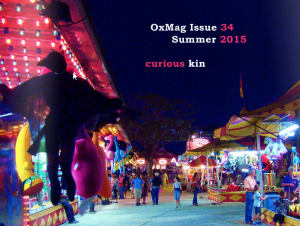The cover of cream city review’s last issue, Genre Queer, depicts a person (he/she/they/ze/zir?) on its cover. This person, arms exposed and covered in tattoos, radiates a warm glow, cactuses grow from the bottom of the magazine and raise their arms towards the person and from the glow emanates words. These words move away from the person, sometimes you can read a full sentence sometimes you cannot. The word faith is repeated over and over again. The cover is exciting: hand drawn and handwritten in a world that seems increasingly hostile to the analog. In short: the cover is different. And difference is the way I would categorize this glorious collection of short stories, essays, poems, interviews, drawings, and genre-defying/busting creations.
The titular “genre queer” folio that is within this book is introduced by way of definition and inclusion, defining the words genre and queer and allowing for a list of self-identifying titles (presumably from the authors) including: transsexual, ftm, genderqueer, two spirit, working class, the list goes on and on.
This section opens with the wonderful line drawings of TextaQueen which combine genre, such as the fifties style monster movies, with fluid gender. TextaQueen’s art are at once a celebration of the many different ways to be and to not be in the case of the zombie-esque Gandhi Returns. This energy — creative, funny, exciting — keeps up through the section that offers us poetry, prose, essays, and short fiction which examines, not only the fluidity/multitudes of gender and gender identification, but the fluidity/multitudes of genre.
“Identification,” by Trace Peterson, asks the question, “Can I see your ID?” over and over again, giving us the varied responses of Trace. The piece starts out straight forward, “Can I see your ID?” “Here it is. I changed my sex so I don’t look like this anymore, but you get the idea.” Veers into humor, “Can I see your ID?” “Oh you know, like Laverne Cox but the Swedish/French WASP version.” Turns to the amply frustrated: “Can I see you ID?” “Shit fuck piss cocker puss cunt Waco dominant fallopian gyno-bot womp decal mother trucker wall detroit czechoslovakia dromedary fuckhouse.” And throughout offers insight into the frustrations Trace faces as people try to identify her: “Can I see your ID?” “Yes, I agree the vagina is the most transcendent possible thing to have.” Peterson’s work fluidly moves through a variety of responses which both show the struggle of identification through the eyes of the laws and the difficulty of identification on the level of the person. The piece is sharp, funny, and thought provoking.
Claire Harlan Orsi’s piece, “Pronoun Discomfort: A Situational Analysis,” is my new obsession. Orsi thoughtfully moves us through their choice to change their pronoun. Orsi pulls on many threads, coming out as they to family, friends, and Facebook, and showing us all the moments of rejection, confusion, frustration, and humor that ensue. The prose is clear, brave, and honest making the reader trust every word Orsi writes. Orsi breaks down, situation by situation, moments in their life and the difficulties faced when confronted with the stickiness of pronouns and the societal preoccupation with pinning a person into “he” or “she.” Each section begins with the word, “Situation,” a tactic Orsi says was inspired by an international student at a writing center who, “used a similar schema to depict her efforts to negotiate English-language conversations.” Orsi points out the many difficulties of trying to navigate this similarly liminal space. Each “Situation” presented pokes at a kind of hard truth, and like all hard truths its truth is intuited yet impossible to pin down: “Situation: I narrate my own life to myself, catch myself using ‘she.’ I don’t admit this to anyone. Does it mean I don’t really want what I say I want? Is it simply a matter of condition? Or am I not real, even to myself?” “Situation: Facebook, in addition to a range of 51 genre options allows users to change their preferred pronoun to they…I shouldn’t need one of the major structures of the techno world order to validate my gender but I am surprised by how good it feels, ‘Capitalism knows me too well,’ I write on my Facebook wall, because there is nothing good that doesn’t also make me feel guilty.” The whole essay is infinitely quotable and an important, honest, and vulnerable piece of work.
The selection of poems, drawings, essays, interviews, short stories and all can and should be enjoyed by a variety of people. I have folded over nearly every page in the magazine, filled the margins with exclamation points and check marks. Other notable moments: Lois Baer Barr’s nonfiction piece on Still-life, the tremendous art of Izzy Jarvis (which I did not fold over because I want to cut it out and hang it on my wall), the short fiction of Kelsey Ronan which harkens back to a Michigan past that looks much different from its present, and the work of Aaron Apps, “Children remain Childish Mostly,” which is both critical of and generous about the “greasy fuck storm” of the internet and the violence that is inherent in our system, “…but maybe we need to be more careful with our language even though it is mostly impossible in this greasy fuck storm where little intervenes into the dumbness of children.”
Cream city review: Genre Queer from the cover makes a promise to their reader that they will experience something different, something that is maybe not easy to define in the binaries that we often work with, within and without. This issue delivers on that promise, blurring the lines between genres. “In this special folio, cream city review celebrates the textually inventive, the playful form, the bent and queer border.” After reading this great issue, you will celebrate it too.
-Katy Shay



